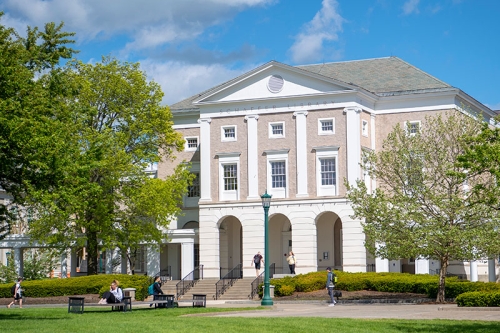SERVICE ANIMAL GUIDELINES
A service animal is defined as a dog that is individually trained to do work or perform tasks for a person with a disability. The work or task a service dog performs must be directly related to the person’s disability. Service dogs may accompany a person with a disability into places that the public normally goes.
Service dogs may be excluded from campus under the following circumstances:
- The dog is disruptive and not effectively controlled.
- The presence of the service dog would fundamentally change the nature of the job, service, or activity.
- The service dog’s presence, behavior, or actions pose an unreasonable or direct threat to property and/or the health or safety of others.
- The dog is not housebroken.
- The animal is not provided appropriate care to maintain health and well-being, and/or the animal is mistreated or abused.
The College is not responsible for the care or supervision of a service dog. Individuals are responsible for the following:
- The health, safety and well-being of a service dog, as well as the cost of any damages as a result of the service dog.
- The immediate clean up and proper disposal of all animal waste.
- The control of the dog at all times.
A student in need of a service animal on campus is asked to contact the Director of Accommodative Services, Laura Galt, at accommodations@union.edu, to discuss their needs and to ensure that appropriate offices are notified, such as the Office of Residential Education & Housing, Academics, and Campus Safety.
ASSISTANCE ANIMAL GUIDELINES
For the purpose of accommodations at Union College, an Assistance Animal is an animal that is recommended by a healthcare or a mental health professional to provide emotional and/or therapeutic support to a person with a disability who has a disability-related need for such support. There must be a relationship, or nexus, between the individual’s disability and the assistance the animal provides. An Assistance Animal is not specifically trained to perform tasks for a person with a disability. Unlike a service animal, an Assistance Animal may not accompany a person with a disability beyond the residential setting (e.g., to academic buildings, libraries, or dining halls).
NOTE: Assistance Animals are NOT permitted to reside in campus residences unless and until the requesting student has received approval and fulfilled all requirements, as noted below.
- As with a service animal, a student is responsible for the control, care, and supervision of his/her Assistance Animal at all times; the College may exclude an Assistance Animal if a student fails to fulfill this responsibility.
